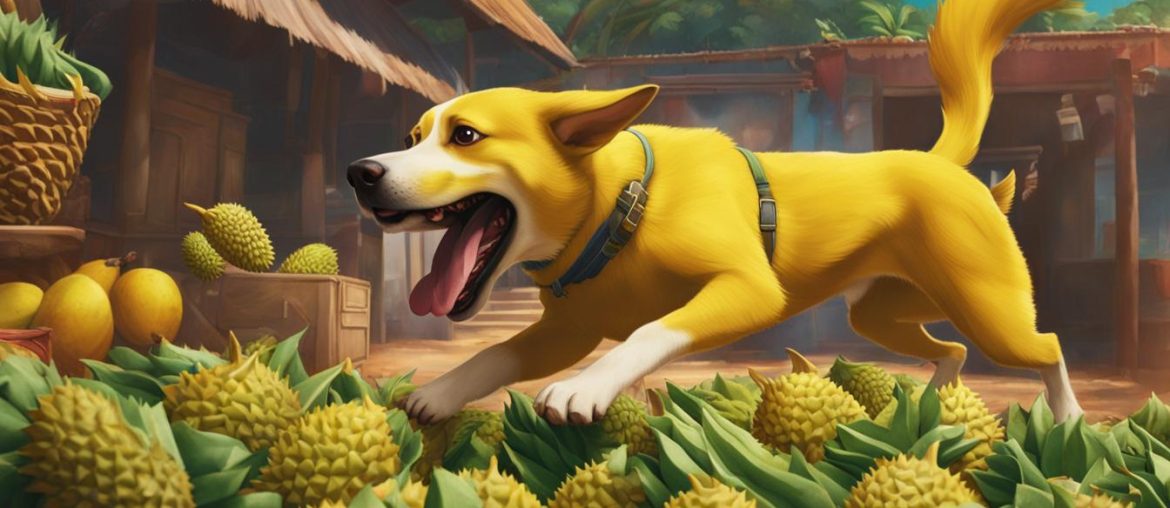Welcome to my latest article, where I will explore the topic of dogs eating durian fruit. As a pet owner, it’s natural to wonder about the safety and health implications of sharing certain foods with our furry friends. In this article, we will delve into whether dogs can eat durian and the precautions you should take if you decide to introduce this exotic fruit to your canine companion.
Key Takeaways:
- Durian fruit can be shared with dogs in small amounts, but only after removing the toxic skin and seeds.
- It’s important to consult a veterinarian before introducing durian fruit to your dog.
- Feeding durian to dogs should be done sparingly and with caution.
- Durian fruit can provide certain health benefits to dogs, but it should not be a regular part of their diet.
- Always monitor your dog’s reaction to durian and watch for any adverse effects.
Is Durian Fruit Safe for Dogs?
Durian fruit is a tropical delicacy known for its distinctive smell and unique flavor. While many humans enjoy this fruit, pet owners often wonder whether it is safe for their furry companions. When it comes to dogs, durian fruit can be consumed, but caution must be exercised. The skin and seeds of durian fruit are toxic to dogs and should be carefully removed before feeding it to them.
Feeding durian fruit to dogs can come with potential risks. One risk is weight gain, as durian fruit is high in fat and calories. It is important to note that excessive weight gain can lead to various health issues in dogs, such as joint problems and cardiovascular issues. Additionally, some dogs may experience digestive issues after consuming durian fruit. Therefore, it is advisable to introduce durian fruit to your dog’s diet in small amounts and monitor their reaction closely.
It’s always best to consult with a veterinarian before giving durian fruit to your dog. A vet can provide specific guidance based on your dog’s breed, age, and overall health. They can help determine whether durian fruit is suitable for your dog and recommend the appropriate portion size. By working with a vet, you can ensure that your dog safely enjoys the occasional taste of this tropical fruit.
Remember, moderation is key when it comes to feeding durian fruit or any other human food to dogs. While durian fruit can offer certain health benefits and be a tasty treat, it should not replace a balanced and nutritious diet specifically tailored for your dog’s needs. Always prioritize your dog’s overall well-being and consult a professional to make informed decisions about their diet.
Health Benefits of Durian Fruit for Dogs
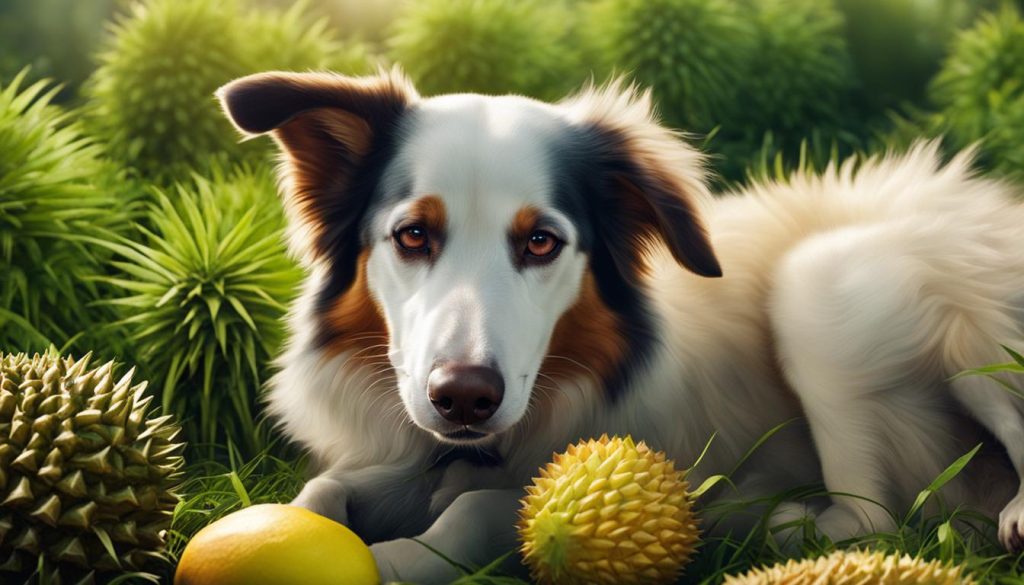
Durian fruit is a tropical fruit that offers several health benefits for dogs when given in moderation. While it may not be suitable for all dogs, it can be a nutritious addition to their diet when prepared and served properly.
Benefits of Feeding Durian to Dogs
Feeding durian fruit to dogs can provide them with essential vitamins and minerals. Durian is rich in vitamin A and C, which are important for maintaining a strong immune system and promoting healthy skin and coat. It also contains vitamin B6, calcium, iron, zinc, magnesium, and phosphorus, all of which contribute to overall health and wellbeing.
Additionally, durian fruit can be a source of healthy fats and calories for dogs who need to gain weight or have specific dietary requirements. The fruit’s creamy flesh contains natural fats that can help maintain healthy skin and promote a shiny coat.
Considerations and Limitations
While durian fruit offers health benefits, it should be given to dogs in moderation. Dogs that are prone to weight gain or obesity should avoid durian due to its high fat and calorie content. It is important to consult a veterinarian before introducing durian to your dog’s diet to determine if it is suitable for their specific needs.
Furthermore, some dogs may not enjoy the strong odor of durian fruit, so it is important to observe their reaction and ensure they are willing to eat it. As with any new food, it is recommended to introduce durian gradually and monitor your dog for any adverse reactions.
Summary
Durian fruit can provide dogs with essential vitamins and minerals, as well as healthy fats and calories. However, it should be given in moderation and is not suitable for all dogs. Consult a veterinarian before introducing durian to your dog’s diet to ensure it is safe and appropriate for their individual needs.
| Benefits of Durian Fruit for Dogs | Considerations and Limitations |
|---|---|
|
|
Preparing and Serving Durian Fruit to Your Dog
Durian fruit can be a nutritious addition to your dog’s diet, but it’s important to prepare and serve it safely. Follow these steps to ensure your dog can enjoy durian fruit without any issues:
- Remove the outer shell: The first step in preparing durian fruit for your dog is to remove the outer shell. This skin is not only tough and difficult to digest for dogs, but it may also contain harmful pesticides or chemicals. Use a knife to carefully cut the durian fruit and remove the shell.
- Remove the seeds: Durian seeds are toxic to dogs and can be a choking hazard. Make sure to remove all the seeds from the fruit before giving it to your dog. You can easily scoop out the flesh of the fruit using a spoon and discard the seeds.
- Cut the fruit into small pieces: Dogs have smaller mouths compared to humans, so it’s best to cut the durian fruit into small, bite-sized pieces. This will make it easier for your dog to eat and digest. Avoid giving your dog large chunks of durian to prevent choking or digestive problems.
- Introduce durian fruit gradually: If your dog has never eaten durian before, it’s important to introduce it gradually. Start by giving them a small piece of durian fruit and monitor their reaction. If they tolerate it well, you can gradually increase the amount over time. However, if your dog shows any signs of discomfort or digestive upset, stop giving them durian immediately and consult a veterinarian.
Remember, durian fruit should only be given to your dog as an occasional treat and not as a regular part of their diet. Always consult with your veterinarian before adding any new foods to your dog’s diet, including durian fruit.
| Durian Fruit Preparation for Dogs | Precautions |
|---|---|
| Remove the outer shell | Avoid ingesting pesticides or chemicals |
| Remove the seeds | Toxic to dogs and can be a choking hazard |
| Cut the fruit into small pieces | Prevent choking or digestive issues |
| Introduce durian fruit gradually | Monitor your dog’s reaction and adjust accordingly |
Canines and Durian Consumption: Considerations and Limitations
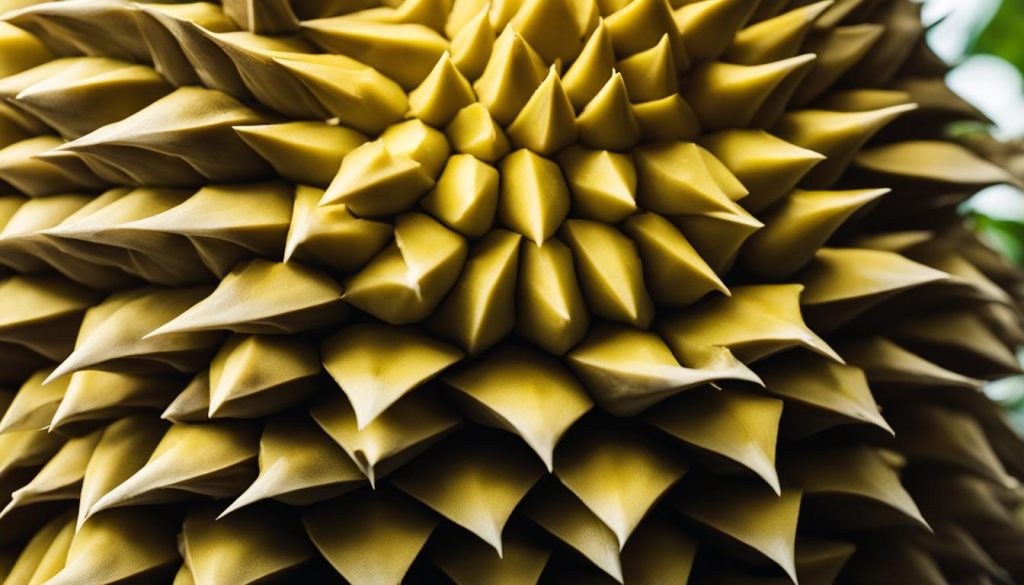
When it comes to feeding durian to dogs, there are several important considerations and limitations to keep in mind. While durian fruit can be shared with dogs in small amounts, it is not suitable for all dogs and should be given sparingly. Dogs with weight issues or those prone to obesity should avoid durian fruit due to its high fat and calorie content. Additionally, some dogs may be sensitive to the strong smell of durian and may not enjoy eating it.
It is crucial to remember that the skin and seeds of durian fruit are toxic to dogs and should be carefully removed before feeding. The edible portion of the fruit, the creamy flesh, can be safely consumed by dogs. However, it is always recommended to consult a veterinarian before introducing durian to your dog, especially if they have any underlying health conditions or dietary restrictions.
Table 1: Potential Risks and Considerations of Feeding Durian to Dogs
| Consideration | Explanation |
|---|---|
| Possible Weight Gain | Due to its high fat and calorie content, durian can contribute to weight gain in dogs, especially if given in excess. |
| Digestive Issues | Some dogs may experience digestive issues, such as diarrhea or upset stomach, when consuming durian fruit. |
| Individual Sensitivities | Each dog is unique, and some dogs may have individual sensitivities or allergies to durian fruit. It is important to monitor their reaction closely. |
| Obesity Prone Breeds | Breeds that are prone to obesity, such as Labrador Retrievers or Bulldogs, should avoid durian fruit to maintain a healthy weight. |
In summary, while durian fruit can provide certain health benefits and be a tasty occasional treat for dogs, it should be given with caution and in moderation. Always prioritize your dog’s overall health and consult with a veterinarian before introducing any new foods into their diet. By taking these considerations and limitations into account, you can ensure a safe and enjoyable experience for both you and your furry friend.
Can Dogs Eat Dried Durian?
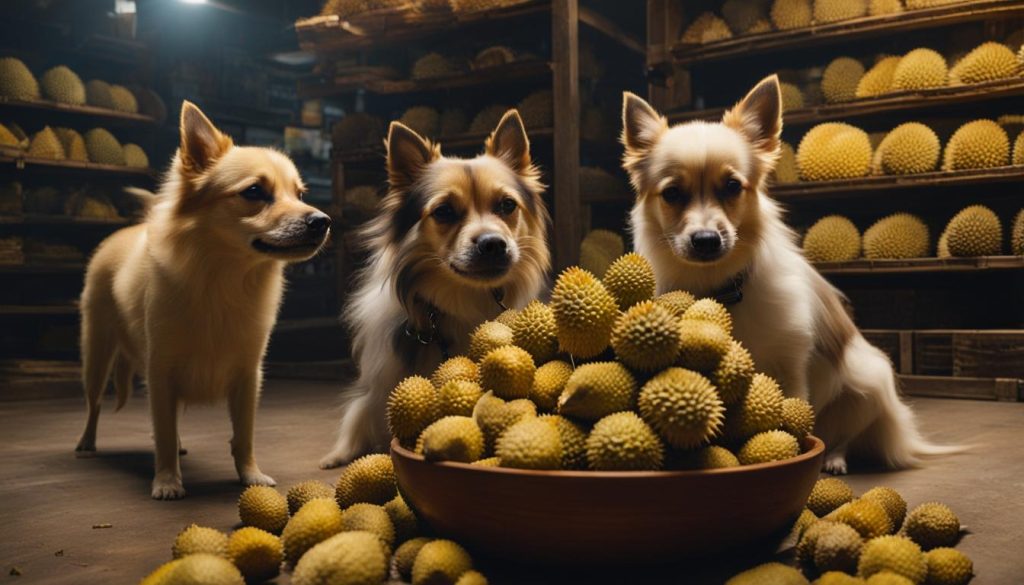
When it comes to feeding dogs exotic fruits, dried durian can be a safe and enjoyable option. Dogs can safely consume dried durian as long as the seeds and shell are removed. Dried durian can provide dogs with added variety in their diet and can be given as a treat or reward. However, it’s important to remember that dried durian should not be used as a substitute for regular meals and should only be given in moderation to prevent any potential gastric problems.
Dogs and exotic fruits can make for an interesting combination, and dried durian is no exception. Although durian has a strong smell that some dogs may find off-putting, the drying process helps to eliminate much of the odor, making it more palatable for our furry friends. As with any new food, it’s essential to introduce dried durian gradually and monitor your dog for any adverse reactions.
Incorporating dried durian into your dog’s diet can provide them with a unique sensory experience and a tasty treat. However, it’s important to remember that dogs have different dietary needs than humans, and moderation is key. While dried durian can be a fun and healthy addition to your dog’s diet, it should be offered sparingly, alongside a balanced and nutritionally complete canine diet.
| Dried Durian Benefits for Dogs | Cautions |
|---|---|
|
|
Can Dogs Eat Freeze Dried Durian?
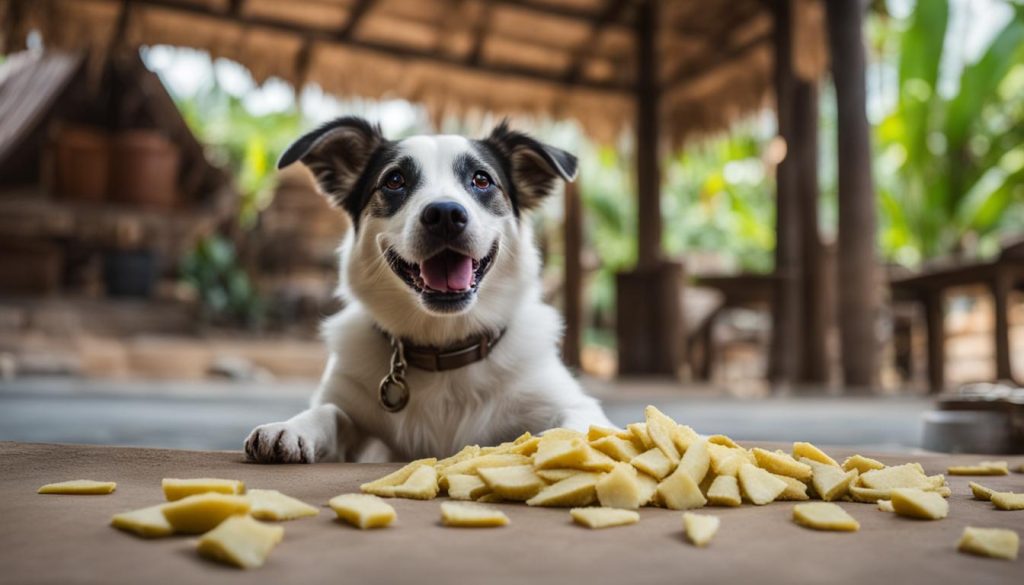
As a professional copywriting journalist, the topic of whether dogs can safely consume freeze-dried durian is an important one. While durian fruit itself can be shared with dogs in small amounts, it is essential to consider the specific preparation and potential risks associated with freeze-dried durian.
Freeze-dried fruits are often considered a healthier alternative to their fresh counterparts, as they retain most of their nutrients and natural flavors. When it comes to freeze-dried durian, dogs can indeed enjoy this treat. The freeze-drying process eliminates the strong odor that dogs may find off-putting, making freeze-dried durian more appealing to them. However, it is crucial to remember that moderation is key, as with any human food given to dogs.
While freeze-dried durian can be a safe and convenient way to introduce this exotic fruit to your furry friend, it should still be given in moderation and as part of a balanced diet. It is important to consult with a veterinarian before incorporating new foods into your dog’s diet. They can provide personalized guidance and ensure that your dog’s specific dietary needs and potential allergies are taken into account.
Ultimately, freeze-dried durian can offer dogs a unique and dog-friendly fruit option. Remember to always prioritize your dog’s health and well-being by providing them with a balanced diet and consulting with professionals when introducing new foods.
Can Dogs Eat Durian Cake?

While durian fruit can be safely shared with dogs in small amounts, you may be wondering if it’s okay for them to indulge in durian cake as well. Durian cake, made with real durian and without added preservatives or coloring, can be given to dogs as an occasional treat. However, there are a few considerations to keep in mind.
Firstly, durian cake should not be a regular part of your dog’s diet. It contains a high amount of sugar, which can lead to weight gain and other health issues if consumed excessively. It’s important to remember that dogs have different nutritional needs than humans, and their diets should primarily consist of balanced dog food.
Secondly, when giving your dog durian cake, it’s essential to monitor their reaction closely. While some dogs may enjoy the taste of durian, others may not find it appealing. Additionally, keep an eye out for any adverse reactions such as gastrointestinal upset or allergic symptoms. If your dog experiences any negative effects, it’s best to discontinue feeding them durian cake.
To summarize, durian cake can be a safe and tasty occasional treat for your dog. Just make sure to offer it in moderation, be mindful of the sugar content, and closely observe your dog’s response. As always, consulting with your veterinarian is recommended before introducing any new food into your dog’s diet.
Table: A Comparison of Different Treat Options for Dogs
| Treat Option | Benefits | Considerations |
|---|---|---|
| Durian Cake | – Occasional tasty treat – Made with real durian |
– High sugar content – Not suitable for all dogs |
| Fresh Fruit | – Variety of vitamins and minerals – Hydrating |
– Some fruits can be toxic to dogs – Moderation is key |
| Dog Treats | – Specifically formulated for dogs – Wide variety available |
– Quality and ingredients vary – Overfeeding can lead to weight gain |
Wrapping Up
To summarize, it is safe for dogs to consume durian fruit in small amounts, provided that the toxic parts, such as the skin and seeds, are removed. Durian can be a nutritious addition to a dog’s diet, but it should be given sparingly and with caution. Before introducing durian to your dog, it is always advisable to consult with a veterinarian to ensure it is appropriate for their specific needs.
Although durian fruit offers health benefits, such as being a source of vitamins and minerals, it should not be a regular part of a dog’s diet, especially for breeds prone to obesity. Additionally, some dogs may not enjoy the strong smell of durian, so it is important to consider their preferences and monitor their reaction when introducing this fruit.
In summary, while dogs can eat durian, moderation is key. Durian should be treated as an occasional treat, and its consumption should be closely monitored. Remember to prioritize your dog’s overall health and wellbeing when deciding to incorporate durian or any other human food into their diet.
FAQ
Can dogs eat durian fruit?
Yes, dogs can eat durian fruit in small amounts after removing the toxic skin and seeds.
Is durian fruit safe for dogs?
Durian fruit is safe for dogs, but only when prepared properly and given in moderation.
What are the potential risks of dogs eating durian?
Feeding durian to dogs can potentially lead to weight gain and digestive issues.
What are the health benefits of durian fruit for dogs?
Durian fruit is loaded with vitamins, minerals, healthy fats, and calories, making it a nutritious addition to a dog’s diet. However, it should not be a regular part of their diet.
How should I prepare and serve durian fruit to my dog?
To safely give durian fruit to your dog, remove the outer shell, seeds, leaves, and stems. Only feed them the creamy flesh of the fruit. Always consult a vet before introducing durian to your dog.
Are there any considerations and limitations when feeding durian to dogs?
Dogs prone to obesity or with weight issues should avoid durian fruit due to its high fat and calorie content. Some dogs may also be sensitive to the strong smell of durian.
Can dogs eat dried durian?
Yes, dogs can eat dried durian as long as the seeds and shell are removed. However, it should be given in moderation and not as a substitute for regular meals.
Can dogs eat freeze-dried durian?
Yes, dogs can eat freeze-dried durian. The freeze-drying process eliminates the strong odor, making it a suitable option for dogs. However, moderation is still important.
Can dogs eat durian cake?
Dogs can eat durian cake as an occasional treat, but it should not be a regular part of their diet due to the high sugar content. Monitor your dog for any adverse reactions.


